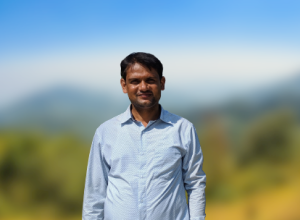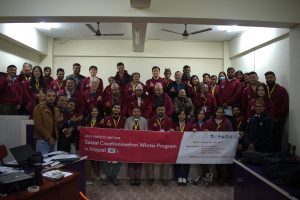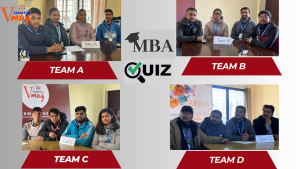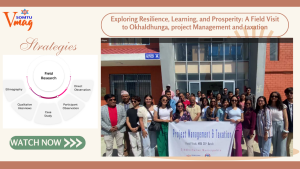Visualizing social issues and enhancing Critical Thinking, MBA GLM – Social Creatinnovation Winter Camp 2024
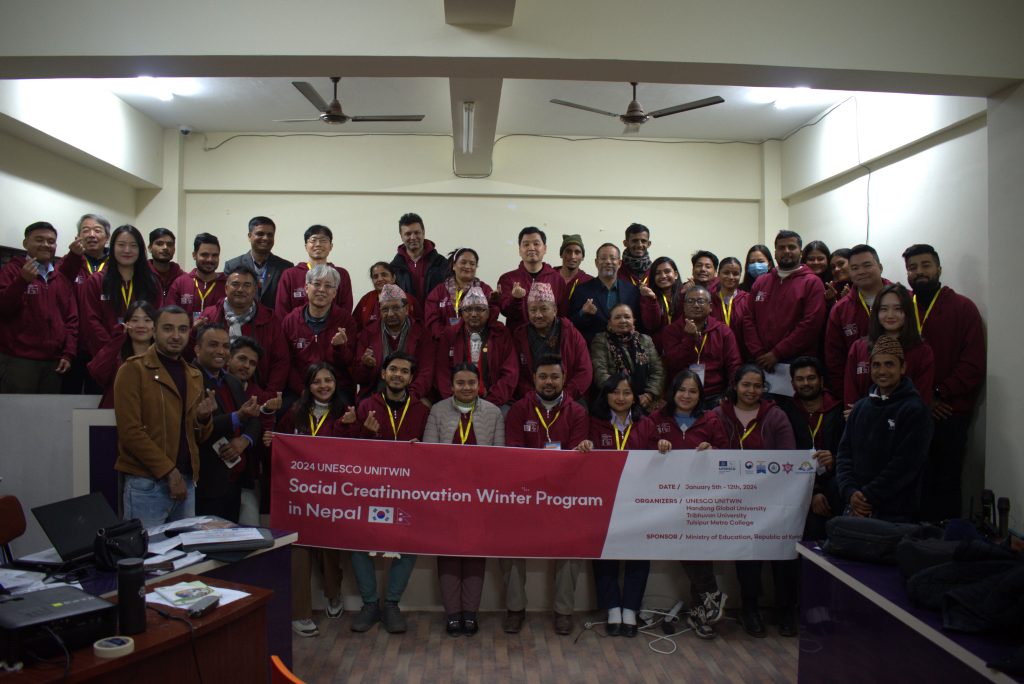
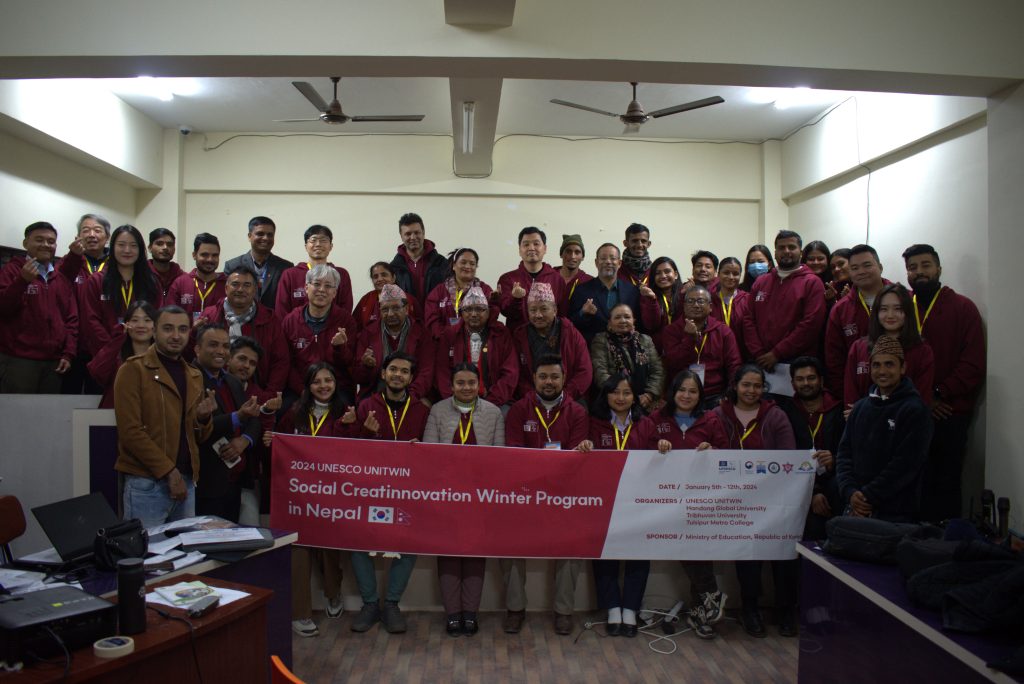
Rahul Shakya, MBA GLM 9th
Introduction
Masters in Business Administration in Global Leadership and Management (MBA GLM) is one of the four uniquely crafted master’s programs offered by the School of Management Tribhuvan University (SOMTU). This program grooms the students to develop leadership abilities, cross-cultural competencies, and strategic thinking skills, empowering them to succeed as global leaders while promoting sustainable business practices in the community. The modality and objectives of the MBA GLM program embody the notion of “Thinking Globally and Acting Locally” where students are mentored on how to engage with local stakeholders and simultaneously leverage global opportunities.
Like most of the MBA courses in the country, MBA GLM is also a 60-credit-hour program spread over two years. What sets the GLM program apart from the rest is the focus on developing a sustainable social enterprise initiated by students considering the concerns of the local community and simultaneously learning about how these ideas could be leveraged on a global scale. Out of the 60 credit hours, 12 credit hours are allocated to project camps, which are evenly distributed across four semesters with three credit hours in each semester. These project camps are a crucial element of the GLM program, and they involve closed camps where students along with mentors, experts, and professors from SOMTU and Hangong Global University, – South Korea collaborate to discuss students’ ideas and develop viable business plans.
In the second week of January 2024, the MBA GLM 10th batch students participated in their first camp. This collaborative camp was initiated by SOMTU, HGU, and Tulsipur Metro College for a two-day boot camp where MBA GLM and Metro College students worked together to identify key social issues in Tulsipur, Dang. The event concluded with innovative recommendations to address these problems. The three-day community visit to Tulsipur Dang aimed to bridge the gap between students and the local community while gaining a deeper understanding of the prevailing societal issues. This boot camp helped students gain a clear understanding of how to identify social problems and the crucial role played by the local stakeholders in understanding these issues.
Different Social Issues Identified by the Students
During the BootCamp, MBA GLM students were paired with Metro college students and divided into four groups to develop practical skills for identifying social issues. Through community visits and conversations with local stakeholders, each group identified a distinct social problem. The details of the problems presented by the groups are as follows:
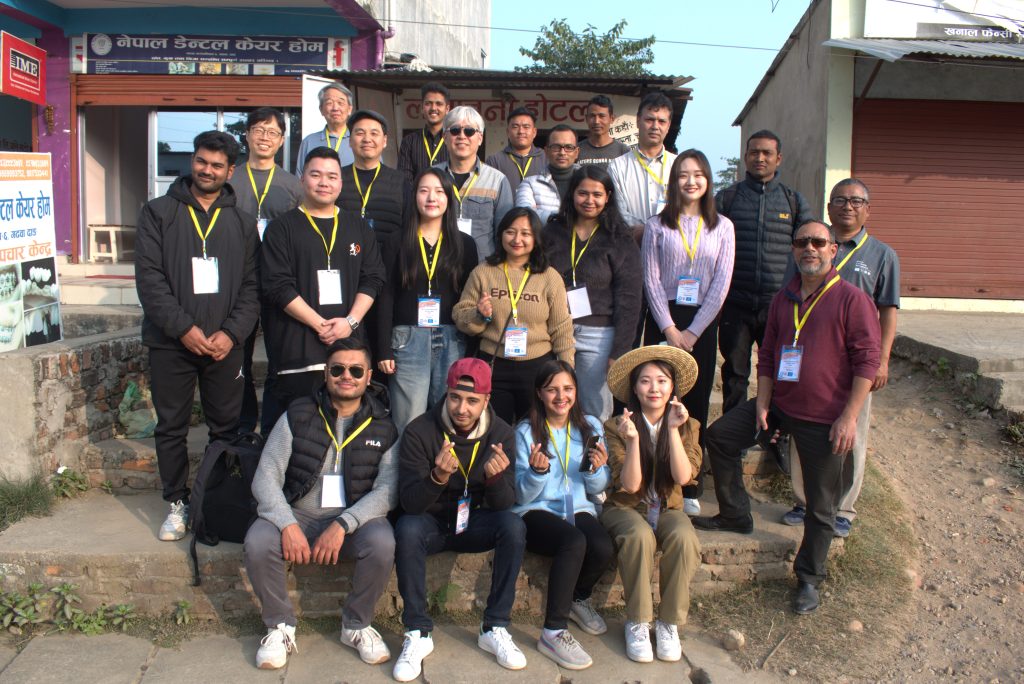
Group A: Illegal immigration to the US
The group had observed a concerning trend of increasing illegal immigration from Tulsipur Dang to the US. After interacting with various households, it was identified that the lack of viable employment opportunities within the country was driving people to migrate through illegal channels, with some even resorting to selling off their assets such as land and homes. To address this issue, the group suggested empowering female community members by engaging them in income-generating activities that leverage locally available resources. The group also advocated for skill and entrepreneurship development programs within the community.
Group B: Abundance of marigold flowers and tomatoes going to waste.
Upon their community visit, the second group addressed the issue of waste production, specifically focusing on the excessive disposal of tomatoes and marigold flowers. A significant amount of these products went to waste, with some even decaying while still on the plant. The primary cause for this waste was identified as overproduction coupled with limited market demand, exacerbated by the lower cost of imported Indian flowers compared to domestic ones. The members of the community also lacked the necessary knowledge and skills to repurpose these excess products through upcycling.
Group C: Challenges in marketing locally grown agricultural products.
The third team focused on the challenges and obstacles associated with selling locally produced agricultural items. The group discovered that the community relied solely on seasonal crops, cultivated through traditional farming techniques, leading to low yield and productivity levels. Furthermore, their contribution to the local economy was minimal with limited job creation and people’s involvement. The team identified some key local resources and recommended potential products and techniques that could increase market access and improve sales.
Group D: Issue of Unmanaged Crematory System
The final groups addressed the issue of the inadequate availability of an efficient crematory management system in Shitalpur, Ward 12 at Tulsipur. They identified several challenges stemming from this situation, including water contamination, pollution, and disparities in cremation services offered to financially disadvantaged families. Additionally, labor migration was identified as one of the contributing factors to the issue, as the community lacked the necessary human resources for managing the crematory system.
Following the presentation, each group was provided with a series of feedback from the mentors and professors from SOMTU as well as HGU. They were also provided with some key comments for further looking down into the social problem. The groups were further asked to dig deep into the issue and explore more relevant data to address these issues. This group activity allowed the students to have three key learnings. Starting with how one should address the stakeholders of the community, followed by things to keep in mind before concluding on the social problems, and finally to develop higher order thinking skills to analyze the issue from different perspectives.
After the presentation, each group received constructive feedback from SOMTU and HGU mentors and professors. The feedback included key insights into the social problem identified by the groups, which encouraged them to conduct further research and explore relevant data. These collaborative activities enabled the students to gain three important insights, including how to address the stakeholders of the community, considerations to be mindful of before concluding on social problems, and the development of higher-order thinking skills that enabled the analysis of social issues from diverse perspectives.
The two-day boot camp featured lectures delivered by distinguished professors from Nepal and Korea, which greatly aided the students in grasping the subject matter and applying it to the exercise of identifying social problems. The event culminated in a certificate distribution ceremony, graced by esteemed guests such as the Mayor of Tulsipur Dang, the Dean of the Faculty of Management, the Acting Director from SOMTU, and teachers from Metro College. The students were highly motivated to develop their entrepreneurial skills in the days to come. The event concluded on an optimistic note, with the hope that the graduating class would generate innovative ideas that prioritize both profit-making and the welfare of society at large.


